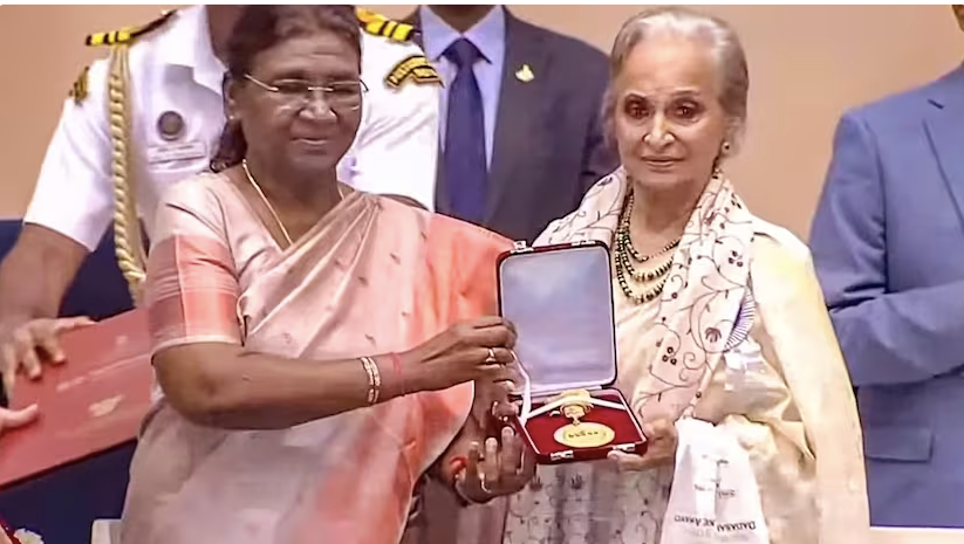19 Oct 2023 : PIB
PRESS INFORMATION BUREAU
19-Oct -2023
1. PM congratulates those honoured with the 69th National Film Awards.
Topic: GS1 – Government awards
Context:
- Prime Minister Narendra Modi congratulated recipients of the 69th National Film Awards.
- He specifically congratulated Waheeda Rehman for receiving the Dadasaheb Phalke Lifetime Achievement Award.
- He acknowledged the outstanding contributions of all the awardees to Indian cinema.

More about National Film Awards:
- Inception: The National Film Awards were established in 1954.
- Purpose: They are presented by the Directorate of Film Festivals, under the Ministry of Information and Broadcasting, Government of India.
- Scope: The awards recognize excellence in Indian cinema, encompassing feature films, non-feature films, and various film-related categories.
- Annual Event: They are awarded annually to honor outstanding contributions to Indian cinema.
- Categories: The awards cover various categories, including Best Film, Best Director, Best Actor, Best Actress, and technical categories like Best Cinematography, Best Editing, and more.
- Dadasaheb Phalke Award: This is the highest honor of the National Film Awards and is presented for a lifetime’s contribution to Indian cinema.
Multiple-choice question:
What criterion must a film meet to be eligible for the National Film Awards in India?
Select the correct option from the following:
- It must be produced by the government.
- It should be released in a minimum of 100 theaters nationwide.
- It must be certified by the Central Board of Film Certification (CBFC).
- It should have a duration of at least 2 hours.
Answer: Option C – It must be certified by the Central Board of Film Certification (CBFC).
Explanation:
- To be eligible for the National Film Awards in India, a film must have been certified by the Central Board of Film Certification (CBFC), ensuring that it complies with the necessary regulations and standards for public exhibition.
- Some of the other criterion are – the film must be released in India in the previous calendar year, the film must be produced in India, the film must be in an Indian language etc.
Source: https://pib.gov.in/PressReleseDetail.aspx?PRID=1968826
2. India stands for International Space collaborations for the larger benefit of mankind: Dr Jitendra Singh
Topic: GS3 – Space collaboration
Context:
- Union Minister Dr. Jitendra Singh reaffirmed India’s commitment to using Outer Space for peaceful purposes and keeping it free of conflict.
- India is a signatory to international space conventions, and Dr. Jitendra Singh urged all spacefaring nations, including China, to ensure that Outer Space remains weapon-free and conflict-free.
- He emphasized the importance of open dialogue, transparency, and collaboration among nations to maintain a secure and stable space environment.
Significance of international space collaborations:
- Scientific Advancement: International space collaborations allow for the pooling of scientific expertise and resources, leading to more significant scientific discoveries and advancements.
- Economic Benefits: Collaborations can reduce costs and share the financial burden of space exploration, making it more economically feasible for participating countries.
- Global Diplomacy: Collaborative space missions foster goodwill and cooperation between nations, contributing to peaceful international relations.
- Technological Innovation: Working together on space projects encourages the development of cutting-edge technologies and promotes innovation.
- Space Exploration: Collaborations enhance the capacity for human space exploration, including missions to the Moon, Mars, and beyond.
- Shared Data: Collaborative efforts often involve the sharing of data and knowledge, benefiting all participating countries and the global scientific community.
- Space Safety: Cooperative efforts can address space debris, orbital congestion, and other safety concerns that affect all nations using space.
Need for conflict-free and weapon free-outer space:
- Preservation of Peace: An outer space free of weapons and conflict helps preserve global peace and stability. The militarization of space could lead to international tensions and conflicts.
- Avoiding Arms Race: The weaponization of space could trigger an arms race, with nations developing and deploying space-based weapons, creating a costly and dangerous competition.
- Ensuring Sustainable Space Exploration: A conflict-free space environment is essential for the sustainable exploration of space. Space should be a domain for peaceful scientific research, exploration, and cooperation.
- Preventing Space Debris: Space conflicts could generate space debris, which poses a severe threat to satellites, spacecraft, and space missions, further polluting space and making it dangerous for future missions.
- Protecting Space Assets: Many critical space assets, such as communication satellites, weather satellites, and GPS systems, are vital for daily life. A weaponized space could put these assets at risk.
- Minimizing Collateral Damage: Space-based weapons can have unintended consequences, potentially causing harm to Earth’s surface if they malfunction or are used in conflict.
- Global Security: A weapon-free space contributes to global security, ensuring that the advantages of space technology are harnessed for the benefit of all nations, rather than being used as tools of conflict.
Question: Discuss the significance of maintaining a conflict-free and weapon-free outer space in the context of international peace, cooperation, and sustainable space exploration. What measures should be taken to ensure the preservation of outer space as a peaceful and shared domain?
Multiple-choice question:
What international treaty aims to establish outer space as a zone free of weapons and to prevent any potential conflict in space?
Select the correct option from the following:
- Outer Space Peace Treaty (OSPT)
- Space Arms Control Agreement (SACA)
- Outer Space Treaty (OST)
- Interstellar Disarmament Pact (IDP)
Answer: Option C – Outer Space Treaty (OST)
Explanation:
- The Outer Space Treaty (OST), adopted in 1967, is a key international treaty that aims to establish outer space as a zone free of nuclear weapons and other military activities.
- It promotes the peaceful use of outer space and prohibits the placement of nuclear weapons in space.
- While the other options may sound plausible, they do not represent the actual treaty that addresses this issue.
3. India is one of the fastest-growing economies with many investment opportunities especially in the food processing sector
Topic: GS3 – food processing sector.
Context:
- Union Minister Shri Prahlad Singh Patel highlighted India’s economic growth and investment opportunities in the food processing sector.

Some important data about food processing sector in India:
- India is the world’s second-largest producer of food, and the food processing sector is one of the most important sectors in the Indian economy.
- It accounts for 9.87% of the gross value added (GVA) in manufacturing and 1.69% of the total GVA in the country.
- The sector employs over 19 million people directly and indirectly.
Importance of food processing sector for Indian economy:
- Employment Generation: It is a major source of employment, especially in rural areas, contributing to income generation and reducing unemployment.
- Agricultural Growth: The sector provides a ready market for agricultural produce, encouraging farmers to diversify and increase crop yields.
- Increases farmers’ incomes: Food processing helps to increase farmers’ incomes by providing them with a better market for their produce
- Value Addition: Food processing adds value to raw agricultural produce, increasing its shelf life and making it suitable for domestic and international markets.
- Foreign Exchange Earnings: Exports of processed food products generate foreign exchange earnings for the country.
- Improved Food Security: Food processing helps reduce food wastage and ensures a steady supply of processed and packaged foods, contributing to food security.
- Enhanced Nutrition: Processing can improve the nutritional value of food products, making them more accessible to a wider population.
Challenges for the sector:
- Infrastructure Deficiencies: Inadequate cold storage, transportation, and warehousing facilities lead to post-harvest losses and affect the quality and safety of processed foods.
- Lack of Standardization: Inconsistent quality and safety standards can hinder trade and consumer trust in processed food products.
- Access to Finance: Many small and medium enterprises (SMEs) in the sector struggle to access affordable financing for expansion and technology adoption.
- Inadequate Skill Development: A shortage of skilled labor and specialized training programs can limit the industry’s capacity for innovation and quality control.
- Supply Chain Inefficiencies: Complex and fragmented supply chains can result in inefficiencies and higher operational costs.
- Regulatory Hurdles: Complying with various food safety and quality regulations can be burdensome for businesses and may deter investment.
- Resource Management: Efficient utilization of resources, such as water and energy, is a concern for sustainable food processing.
- Market Access: Expanding into international markets is often complicated due to trade barriers, quality standards, and certification requirements.
- Food Safety Concerns: Ensuring food safety is critical, and any lapses can lead to consumer health risks and damage the reputation of the industry.
Way forward:
- Invest in Infrastructure: Develop and upgrade cold storage, transportation, and warehousing facilities to reduce post-harvest losses and improve supply chain efficiency.
- Standardization and Compliance: Strengthen and enforce consistent quality and safety standards, providing guidance and support for businesses to comply.
- Financial Support: Facilitate access to affordable financing options for SMEs and startups in the food processing sector to encourage investment and expansion.
- Skill Development: Establish training programs and skill development initiatives to create a skilled workforce capable of managing modern food processing techniques.
- Supply Chain Optimization: Streamline supply chains and foster collaboration among stakeholders to reduce inefficiencies and operational costs.
- Regulatory Reforms: Simplify and harmonize food safety and quality regulations to reduce compliance burdens on businesses.
- Research and Innovation: Encourage investment in research and development to drive innovation in product development, technology adoption, and packaging.
- Market Expansion: Support food processors in penetrating international markets by providing information on trade regulations, standards, and certification requirements.
- Technology Adoption: Encourage the adoption of advanced technologies, such as automation and digitalization, to improve production and operational efficiency.
Question: Examine the role of the food processing sector in the Indian economy. Discuss the key challenges faced by the sector and propose measures to promote food processing sector in India.
For Enquiry

19 Oct 2023 : PIB

19 October 2023 : Daily Current Affair

19 October 2023 : The Hindu Editorial Notes PDF

18 Oct 2023 : Daily Answer Writing

18 Oct 2023 : Indian Express

18 Oct 2023 : PIB

18 October 2023 : Daily Current Affair

18 October 2023 : The Hindu Editorial Notes PDF

17 Oct 2023 : Daily Quiz

17 Oct 2023 : Daily Answer Writing
October 2023 PIB 19 Oct 2023 : PIB PRESS INFORMATION BUREAU
19-Oct -2023
1. PM congratulates those honoured with the 69th National Film…
Daily Current Affairs 19 October 2023 : Daily Current Affair Daily Current Affairs
19-October-2023
1. The measure of the working woman.
Topic: GS3 – gender…
October 2023 The Hindu 19 October 2023 : The Hindu Editorial Notes PDF The Hindu Editorial
19-October-2023
1. The explosion of digital uncertainty
Topic: GS3 – artificial…
mains answer writing 18 Oct 2023 : Daily Answer Writing Mains Answer Writing
18-october-2023
1. Analyze the potential challenges and benefits involved in leveraging…
Indian Express 18 Oct 2023 : Indian Express Indian Express
18-October-2023
1) Same-Sex Marriage in India
Context:
The Supreme Court has issued…
October 2023 PIB 18 Oct 2023 : PIB PRESS INFORMATION BUREAU
18-Oct -2023
1. This year’s ‘Ayurveda Day’ to be organized…
Daily Current Affairs 18 October 2023 : Daily Current Affair Daily Current Affairs
18-October-2023
1. Cannot legalise same-sex marriage, says SC Bench.
Topic: GS2…
October 2023 The Hindu 18 October 2023 : The Hindu Editorial Notes PDF The Hindu Editorial
18-October-2023
1. Demolishing the frame from outside the Constitution
Topic: GS2…
Daily Quiz 17 Oct 2023 : Daily Quiz 17 Oct 2023 : Daily Quiz…
mains answer writing 17 Oct 2023 : Daily Answer Writing Mains Answer Writing
17-october-2023
1. Corruption corrodes the fabric of governance, eroding the public’s…



